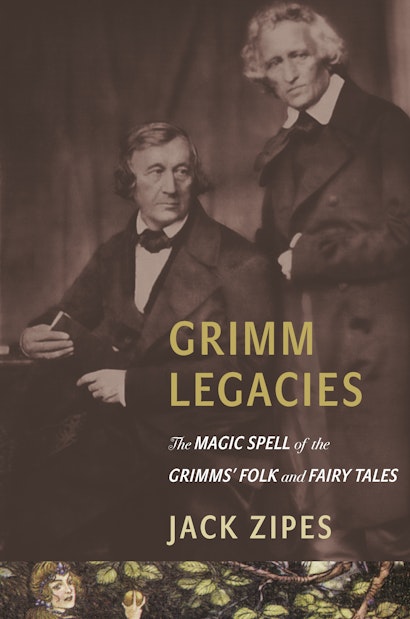In Grimm Legacies, esteemed literary scholar Jack Zipes explores the legacy of the Brothers Grimm in Europe and North America, from the nineteenth century to the present. Zipes reveals how the Grimms came to play a pivotal and unusual role in the evolution of Western folklore and in the history of the most significant cultural genre in the world—the fairy tale.
Folklorists Jacob and Wilhelm Grimm sought to discover and preserve a rich abundance of stories emanating from an oral tradition, and encouraged friends, colleagues, and strangers to gather and share these tales. As a result, hundreds of thousands of wonderful folk and fairy tales poured into books throughout Europe and have kept coming. Zipes looks at the transformation of the Grimms’ tales into children’s literature, the Americanization of the tales, the “Grimm” aspects of contemporary tales, and the tales’ utopian impulses. He shows that the Grimms were not the first scholars to turn their attention to folk tales, but were vital in expanding readership and setting the high standards for folk-tale collecting that continue through the current era. Zipes concludes with a look at contemporary adaptations of the tales and raises questions about authenticity, target audience, and consumerism.
With erudition and verve, Grimm Legacies examines the lasting universal influence of two brothers and their collected tales on today’s storytelling world.
Awards and Recognition
- Winner of the 2015 Chicago Folklore Prize, American Folklore Society and the University of Chicago
"[F]ascinating."—Michael Dirda, Washington Post
"Clear, precise, discreet, and exceedingly well informed about scholarship on the Grimms."—Willis Goth Regier, World Literature Today
"With this book Zipes positions [the Grimm] legacy among the forces of gods, dwarfs, samurai, cowboys, fairies, and other mutants better than does any other living author—again revealing the fairy tale as a genre of enlightenment as well as escape."—Choice
"The salience of authorial presence along with the personalized intensity of Zipes's critiques, suggests that this fine scholarly publication exploring the legacy of two nineteenth-century brothers may also secondarily express a solicitude for the legacy of a remarkable modem-day scholar."—Rebecca Anderson, Children's Literature Association Quarterly
"Grimm Legacies is a must read for anyone with a sincere interest in the lives of the Brothers Grimm and fairy-tale scholarship. . . . [An] innovative landmark work . . . highly recommended."—Claudia Schwabe, Marvels & Tales
"One would be hard-pressed to name another scholar as familiar with so many different facets of his or her material. Zipes is widely considered a leader in fairy-tale studies, and the impeccable scholarship he displays in this book makes it evident why. . . . Superbly rich and innovative, Grimm Legacies is a welcome addition to the fairy-tale studies and a fantastic example of the field at its best."—Brittany Warman, Journal of American Folklore
"Even the harshest of critics cannot help being impressed by the aforementioned (over)enthusiasm and erudition of this self-proclaimed ‘fairy-tale junkie' (132), as well as his familiarity with an extraordinary number of retellings and adaptations from different countries, time periods and media."—Nada Kujundzić, International Research in Children's Literature
"Grimm Legacies has rich contents, with many insightful analyses and comparative perspectives, based on Zipes' wide knowledge on both German, English and American fairy tales and their research."—Dr. Kirsti Salmi-Niklander, Fabula
"With his latest book, Jack Zipes has established his own legacy in folk and fairy tales research. . . . Grimm Legacies sums up his research on the subject and enlarges it by reflecting on the reception of the Grimm Fairy Tales in the German- and English-speaking world in the twentieth century. It does not happen often that a collection of essays comes together so cohesively in one volume."—Klaus L. Berghahn, Monatshefte
"Readers of Grimm Legacies are the winners here. While many fairy tales in German and English-speaking countries (the focus of his study) clearly disappoint Zipes, others just as clearly delight him and are sure to inspire many others to read some of these books themselves."—Adrienne Kertzer, European Legacy
"In this landmark work of fairy-tale scholarship, Jack Zipes comes to grips with the multiple legacies of the Brothers Grimm in German and Anglo-American cultures. With nuance and inexhaustible insight, Zipes shows how mythmaking, marketing, hype, Americanization, the appeal of collective action, and utopian longing have sustained 'the magic spell' of the Grimms' tales throughout two centuries of use and abuse. Anyone seeking to understand the popularity of the Grimms' fairy tales or their richly diverse reception will do well to begin here."—Donald Haase, editor of The Greenwood Encyclopedia of Folktales and Fairy Tales
"Magisterial and magnificent, Grimm Legacies decodes the intention, reception, and impact of the Grimms' fairy tales as they conquered Germany, the Anglo-American world, and, by way of multifaceted literary and filmic adaptations, the globe. Based on impeccable and informed research, this interpretive book challenges and delights readers with its innovative and detailed investigation of the many legacies of the globalized Grimms' tales."—Wolfgang Mieder, University of Vermont
"A comprehensive look at the origins, evolution, and reception of the Grimms' tales, laid out with the kind of breadth and depth that only Zipes's deep and productive engagements with fairy tales in all their vibrant incarnations could produce. Grimm Legacies is rich and informative, and continually finds new territory to explore and fresh ground to cover."—Maria Tatar, author of The Annotated Brothers Grimm
"Jack Zipes is perhaps the foremost American scholar of the Brothers Grimm—in this book his encyclopedic knowledge of all things Grimm shines through. Zipes portrays the Grimms' way of thinking from when they started and developed their collection, to their very deaths. This book's scholarly details are impeccable."—James Dow, professor emeritus of German, Iowa State University


